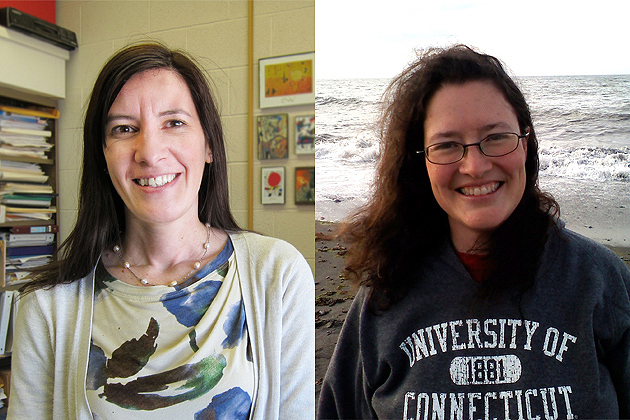The American Association of University Professors has awarded two CLAS professors its 2012 Excellence Awards in the field of teaching. Fabiana Cardetti in mathematics received a Teaching Promise award, and Pamela Bedore in English won a Teaching Innovation award.

Cardetti, associate professor and Teachers for a New Era associate director, came to UConn in 2002 as a post-doctoral fellow. While doing her research, she was asked to teach a course for students who want to become teachers. The main idea of the course? Teach them how to teach math.
“The best approach is to show people how to look at math the way mathematicians do,” she says. “We want them to look at it with a mathematician’s eye.”
For example, says Cardetti, telling a student to move decimal places when multiplying will only make him memorize the rule. But to explain to him why that makes sense and how mathematicians realized that procedure is important.
“The rules are the least important thing,” she says. “If Jimmy is thinking correctly, mathematically, but gets the wrong answer, then it’s easy to tell him he’s wrong. Then Jimmy feels like he’s bad at math.”
Instead, taking a slow approach that emphasizes logical thinking has worked for Cardetti.
“I wasn’t the quickest student in school,” she laughs. “Anyone can learn math.”
Cardetti says she doesn’t remember ever seeing a college student who came into her class with anxieties about math leaving with those same anxieties. Part of the idea is to make the students confident that they can teach math to children.
“They’re the ones who will be out there with our little ones,” she says.
“Struggling is part of the process,” she adds. Her own 4-year-old son prefers writing and drawing much more than counting and math. “That struggle is necessary to understand who you are as a learner.”
Assistant Professor of English Pam Bedore teaches the kind of classes that make your ears perk up: “Science Fiction,” “Detective Fiction” and even “Steven King and Cultural Theory.”
“It’s important to have the foundational understanding of classic literature, like British

and American literature,” she says. “But I think that when you teach using texts that are easy to read, it makes it easier to bring in complicated literary theory.”
When reading classic literature, such as “Beowulf” or Goethe’s “Faust,” Bedore says it’s easy to spend a lot of time figuring out the story’s content, leaving little time for analysis. But when reading popular fiction, she says, students already know they’re interested in the material, and the plots are easy to follow.
Bedore says that she loves reading and talking about books, so this approach is an ideal way to get students talking. She also brought in the HuskyCT network to assist students in their discussions. Sometimes she asks students to discuss a story online while they’re in class, which can encourage the quieter students to join the conversation.
In the fall, there is a lot of interest in Bedore’s vampire fiction class, thanks to the recent surge of vampire popular fiction and movies.
“Death, sex, immortality and time…those are some pretty heavy themes!” She’s looking forward to beginning with classic vampire fiction – Bram Stoker’s “Dracula” – and moving toward today’s pop fiction for comparison. Much of her own research focuses on gender theory, so the class will explore how males and females interact and have evolved in the genre.
“I hope that after my class, students will look around them at cultural works – books, movies, plays – and start thinking about how they work,” she says. “What are the narratives? How can it be seen as literature? I hope it will affect their perspective on culture down the road.”



